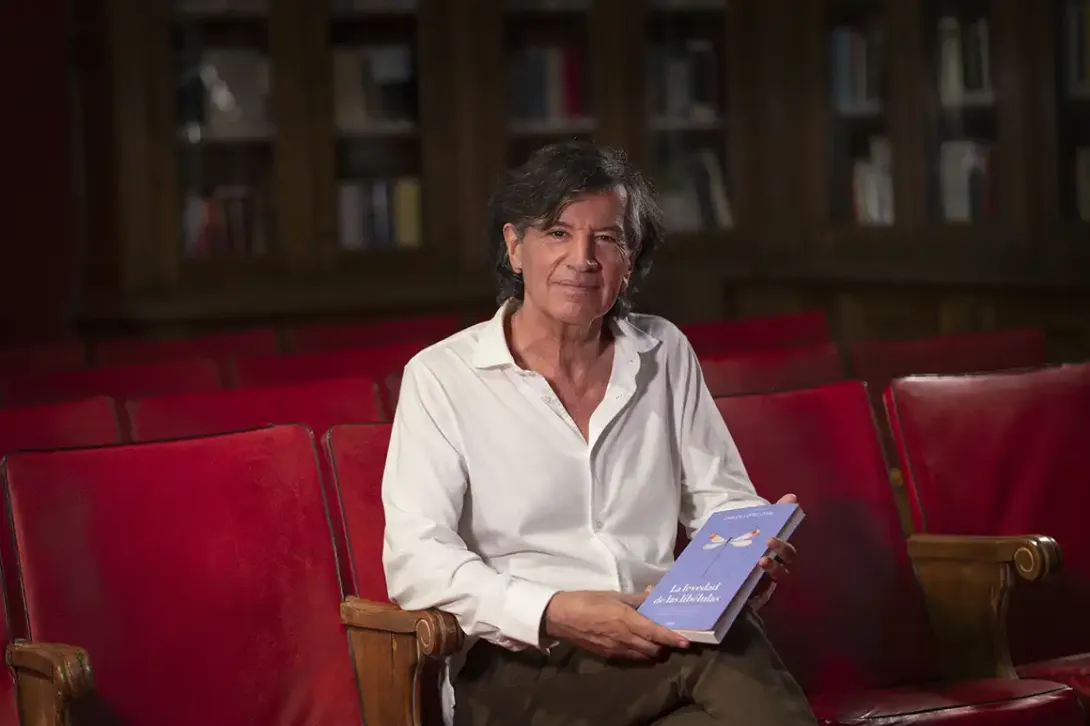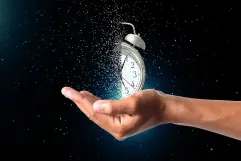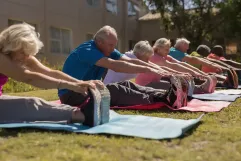
We speak with Dr Carlos López-Otín, Professor of Biochemistry and Molecular Biology and author of "La levedad de las libélulas", about the keys to healthy ageing.
“Having a vital purpose is an elixir for long life”
Considered to be one of the Spanish scientists with greatest international prestige, López-Otín has researched cancer and the ways to beat aging in depth. At the same time, he has written relevant informative essays that reflect on all these questions. His view brings together the advanced knowledge provided by science and humanist wisdom.
What do you think is the belief held regarding aging and death in our societies?
Our relation with both biological processes is complex and often highly unsatisfactory. It is not simple to accept that aging and death are natural processes that have accompanied us throughout our evolutive history and that have been fundamental since 3,800 million years ago when life started to make its way on our planet. I always remind my students that, in order to move forward, life had to invent death. I myself, accept aging and death with complete normality. I do not believe in immortality; the aspects that occupy and concern me are the illnesses associated with the passing of time, not aging itself. My work does not involve trying to beat it, but rather trying to understand it, firstly in molecular and cellular terms and more recently delving into social and emotional aspects in greater depth. And with regard to death, I become overwhelmed when a death is inopportune, a death derived from hereditary or minority illnesses for which there are no suitable therapies, a death that arises from common pathologies that science and medicine can only pitch a partial and insufficient knowledge at present. But these insufficiencies cannot be used as an excuse to make an ode to ignorance and promote it from positions of power and influence.
To a certain extent, you wrote your first book in the “Trilogy of Life”, ‘La vida en cuatro letras’ (Life in four letters – Paidós), to “help yourself”, since, as you have explained, you had lost your purpose in life. What importance does this vital purpose have on our health and long life expectancy?
I was educated by great masters and mentors in the study of the molecular and cellular keys of life and disease. However, the passing of time and our own scientific work have shown me that there are other factors, including social and emotional ones, which have a decisive influence on our health and long life expectancy. Amongst these, the fact of having a vital purpose is a good elixir. There are many types of ikigai, therefore each of us must find our own and assume the fact that you cannot last for ever. For me, the concept of a vital purpose is very solid when I consider the long-term, but necessarily dynamic in the ways to face up to it.
What factors could we indicate as important for a healthy long life expectancy? Which positive habits can we develop for an improved old age?
In my last book, La Levedad de las libélulas (The Lightness of dragonflies) (Paidós), I have reflected in depth on these questions and I have proposed a health equation that summaries my thoughts on this point This formula condenses an idea based on the fact that health is derived from nine dynamic characteristics that maintain the functions of our organism and that ensure our physical and emotional well-being. The first three keys cover the more strictly molecular aspects and can be specified in three ideas – space, time and regulation, which seek to ensure everything that should happen in our bodies happens in its place, at the right time and in perfect coordination. However, the art of health is much more complex and includes other factors related to our particular lifestyles regarding nutrition, exercise and sleep, while we try to avoid negative aspects such as stress and toxicity both environmental and human. Finally, I have incorporated a ninth key, the psychosocial adaptation that attempts to put the aspects relating to emotional well-being into a molecular context, while indicating that the deficiencies of this area are behind the epidemic of sadness that is spreading through our society.
Will the new generations age better than their predecessors? Will the difference between the biological age and the chronological age increase?
One hundred years ago, in highly advanced countries, the average life expectancy was around 35 years. Today, in Spain this figure is over 80 years and there are around 20,000 centenarians. These figures are going to increases, and I hope that the scientific, medical and social advances determine that we all live a little more and above all, a little better.
Should older people play a more active role in our society? Will this happen in a near future?
This is a very difficult question, as what is perceived in general is a lack of respect, disdain, neglect and margination towards the older generation. On the other hand, I have been lucky enough to know marvellous professionals in the field of geriatrics and in primary care, who give exceptional, exemplary care for old people. My parents spent their last years in the local home for the elderly in the village where I was born and I cannot put into words my gratitude to all the staff who looked after them with never-ending respect and love. We are, therefore, faced with a dilemma that we can only face up to with one word: education. The level of education of our society and the definition of its real priorities – not the ones that are quoted, but are then not fulfilled, will be the one that determines the role that the older generation will have to play in a future in which they will represent most of the population.



